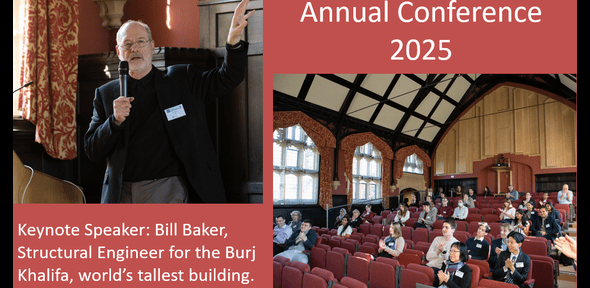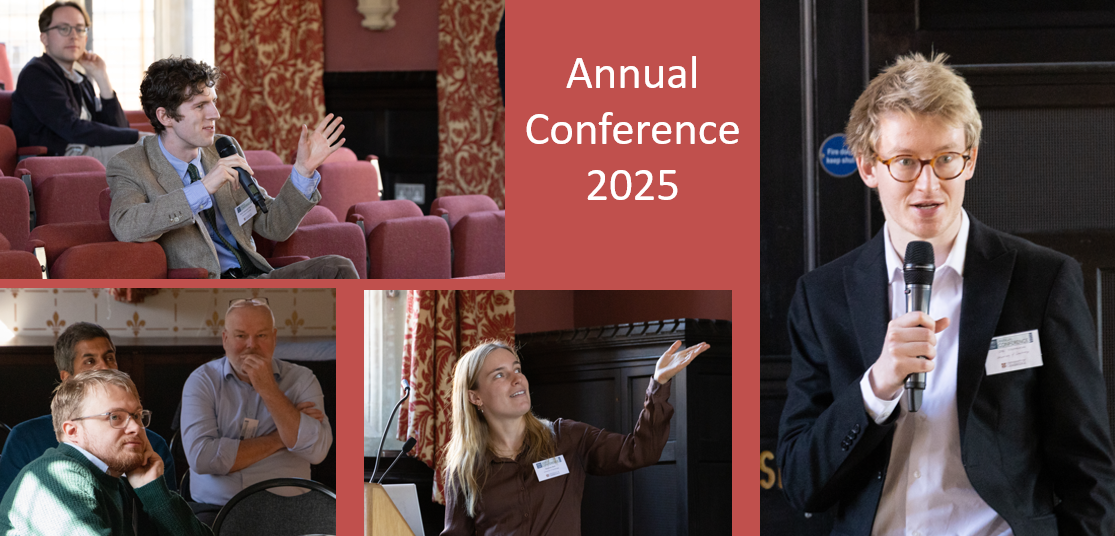
Submitted by Paula Block on Tue, 18/03/2025 - 13:20
This year’s Annual Conference was organized by Cohort 4. India Harding, Cohort Rep opens the conference held at Old Divinity School, St John's College with a welcome from FIBE2 Head and Director, Prof Abir Al-Tabbaa. Prof Sarah Sharples, Chief Scientific Advisor for the Department of Transport, took the virtual stage with an online presentation on “Transport Infrastructure – How can Science Help?”, exploring the evolving landscape of transport infrastructure, particularly in the context of financial constraints and the urgent demands of achieving Net Zero emissions. She highlighted how climate change exerts a latent yet profound influence on transport systems, necessitating a fundamental, systemic transformation. This transformation involves a shift from traditional physical infrastructure toward digital innovation—enhancing the travel experience, streamlining construction processes, revolutionizing communication, and ultimately reshaping the very need for travel.
The conference featured two breakout rooms, where Cohort 4 PhD students showcased their individual research projects. Each presentation was followed by an engaging Q&A session, allowing attendees to delve deeper into the students’ work and insights.
A standout moment was the keynote address by Bill Baker, the visionary structural engineer behind the Burj Khalifa, the tallest building in the world. In his compelling talk, “The Philosophy of Design and Construction,” Baker explored how infrastructure must evolve in response to the climate crisis. He emphasized the enduring value of efficiency, simplicity, and minimalism in engineering, while also advocating for economy, elegance, and utility in design. His philosophy underscored the importance of harmony, order and hierarchy, and the thoughtful integration of form and function to create structures that are both resilient and refined.
The panel discussions began with the central question: “How can infrastructure adapt to meet the demands of a sustainable, resilient future?” The panel featured a distinguished lineup: Dr. Renjie Mi, Dr. Wei Bi, Dr. Rohit Prajapati, Dr. Barnali Ghosh (Technical Director at Mott MacDonald), and Mr. Chetan Kotur (Head of Innovation and Technology at Laing O’Rourke).
Dr. Wei Bi addressed the urgent need to decarbonize road transport, outlining strategies to achieve net-zero emissions by 2030. She emphasized the importance of adapting infrastructure—such as expanding electric vehicle charging networks—to support this transition.
Dr. Rohit Prajapati focused on the cement industry, one of the most carbon-intensive sectors. He discussed innovative approaches to decarbonizing limestone processing, including the use of electric arc furnaces and modified purification chemistry to reduce reliance on fossil fuels.
Dr. Barnali Ghosh advocated for a shift in design philosophy—moving away from overdesign and toward adaptive design principles. She highlighted the potential of recycling concrete and designing infrastructure that can respond flexibly to varying climate conditions, rather than being built for a fixed set of loads.
Mr. Chetan Kotur emphasized that sustainability must endure the test of time. He called for a step-change in innovation—transforming not only construction methods but also the skills of the future workforce. He championed advanced manufacturing as a key enabler in reshaping how we build.
The day concluded on a high note, wrapping up a dynamic and insightful conference focused on the future of sustainable infrastructure. From thought-provoking student presentations and engaging breakout sessions to a powerful keynote by Bill Baker and a forward-looking panel discussion, the event fostered meaningful dialogue around innovation, climate resilience, and adaptive design. The final panel sparked a lively exchange with the audience, reinforcing the importance of collaboration and bold thinking in shaping tomorrow’s infrastructure. The conference drew to a close with a warm and celebratory dinner at St John’s College, offering a fitting end to a day of inspiration and connection.


